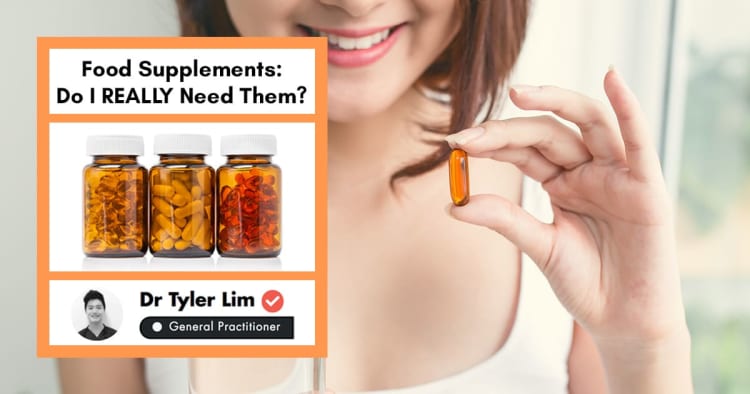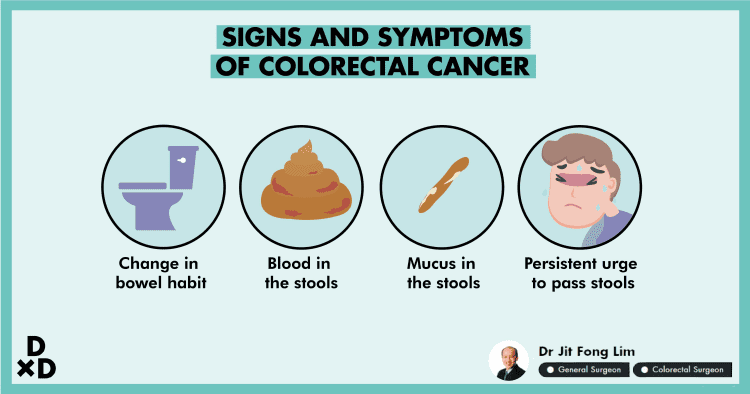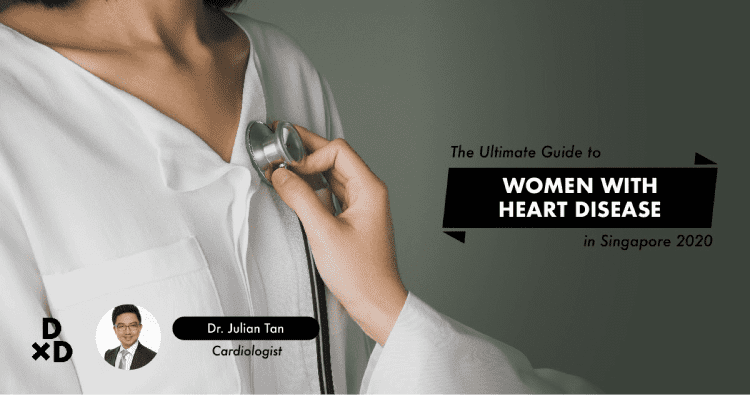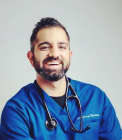Thinking of getting food supplements in Singapore? Which one? There are simply so many different kinds. Consider these factors before getting them!
Most people in Singapore would relate the words fast-paced, busy, and hectic with their lifestyles. At times, nutritious foods might not be on our priority list. For that, people would often rely on food supplements.
Multivitamins, Calcium, Omega 3 Fatty Acids, Fish Oil, Zinc, and much more. I am sure that you would have come across bottles of these food supplements when you visit a supermarket. Especially in Singapore, you can find them literally everywhere. Millions of people around the world swear on their ability to improve health conditions and take multiple pills daily.
Have you ever stop and consider: Do I really need supplements? Why do I need to take supplements? Why am I taking this specific supplement?
It is impossible to cover every single supplement one by one. A supplement that works for others may not work for you. Supplements can only work if it is individualised to you.
I wrote this post to help you sort that out. Scroll down to find out more!
What are food supplements?
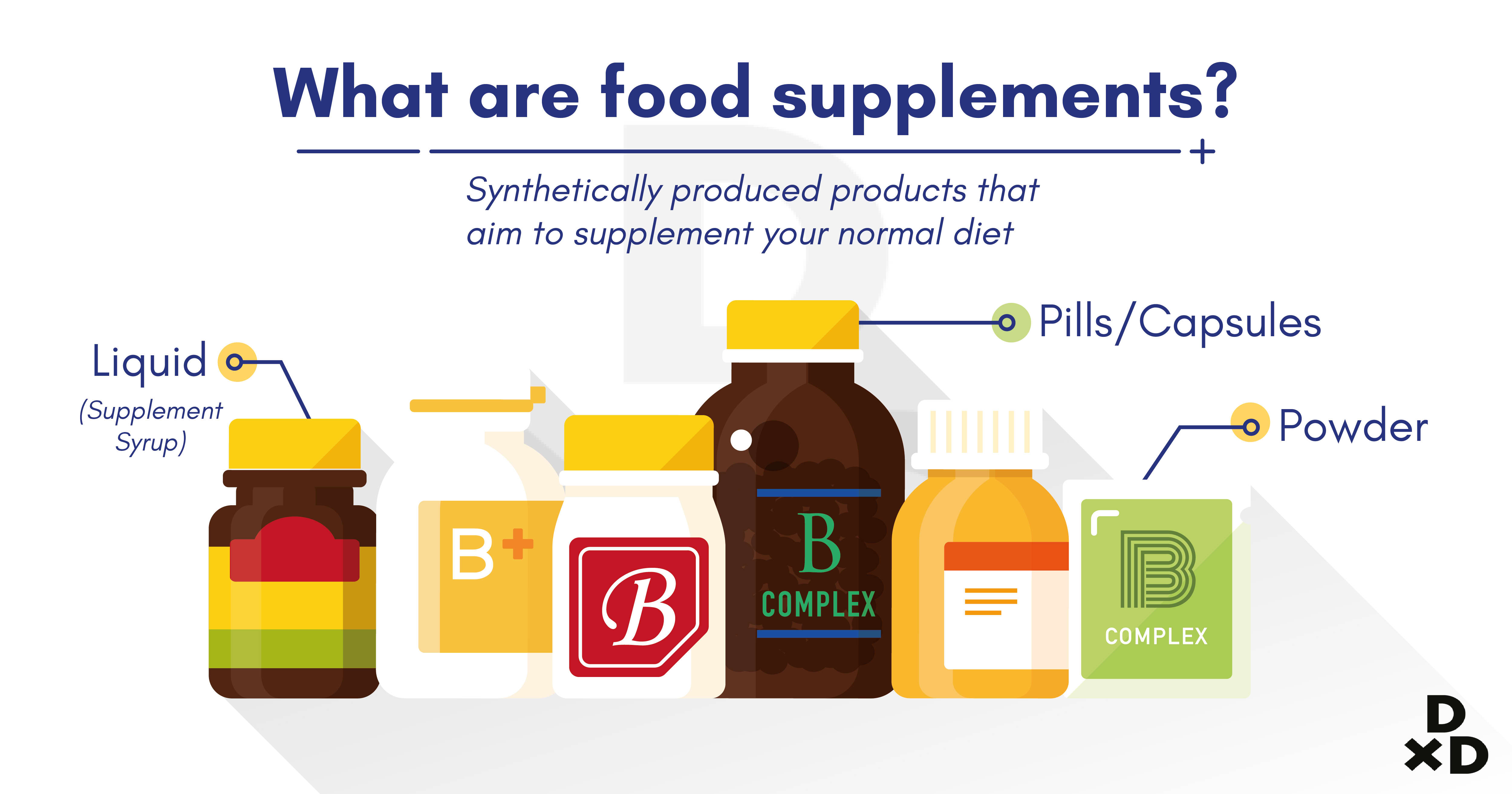
Also known as dietary supplements, they are synthetically produced products in the form of powder, pills or liquid. They are made to supplement deficiencies that a person may have from their diet, work or lifestyle.
A supplement typically contains one or more of the following:
- Vitamins
- Minerals
- Herbs or botanical substances
- Amino acids
- Fatty acids
- Enzymes, and much more
in any form (concentrate, extract, or combinations).
It is important to note that these products are meant to supplement, not to replace conventional whole foods [1].
Who needs food supplements?
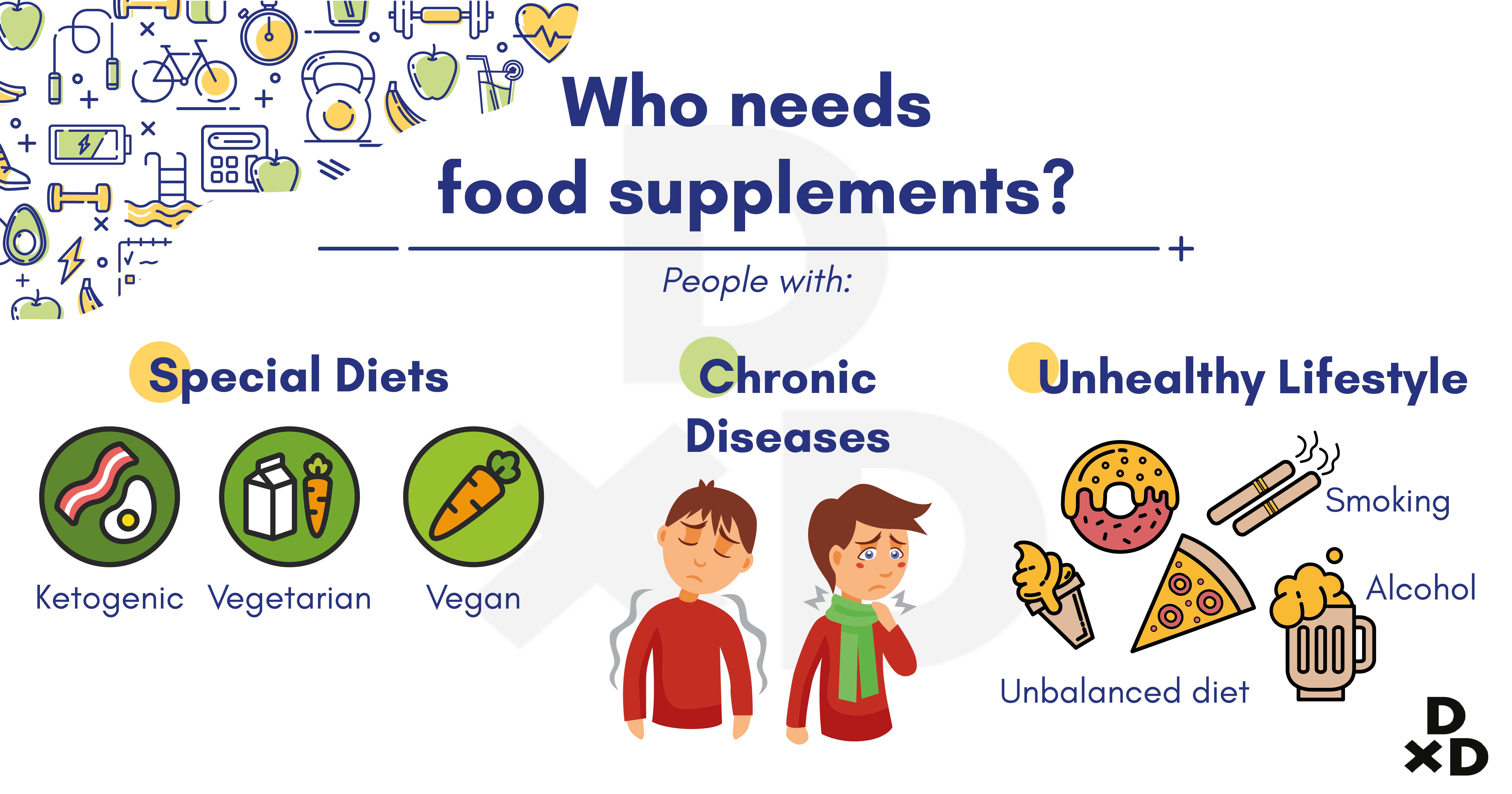
Food supplements are beneficial and necessary only for people with nutrient deficiencies or proneness to nutrient deficiency.
They are recommended if you have:
- Special diets or dietary restrictions (veganism, keto, etc.)
- Chronic diseases or other medical conditions
- Very unhealthy lifestyle (unbalanced diet, heavy alcohol drinkers, smoking, etc.)
You might also need supplements if you have an increased nutrient requirement. This is such in babies, infants, pregnant women, and the elderly.
There are different kinds of dietary supplements. It is important to note that taking anything in excess is dangerous. Do contact your doctor or a dietician to figure out which ones are necessary for you.
If you have a normal and balanced three-meal daily diet, you probably do not need food supplements. They are not necessarily bad but at most times, they do little to nothing for your health.
Also read: The Ultimate Guide to Supplements for Joint Health in Singapore (2021)
Why do so many people take food supplements?
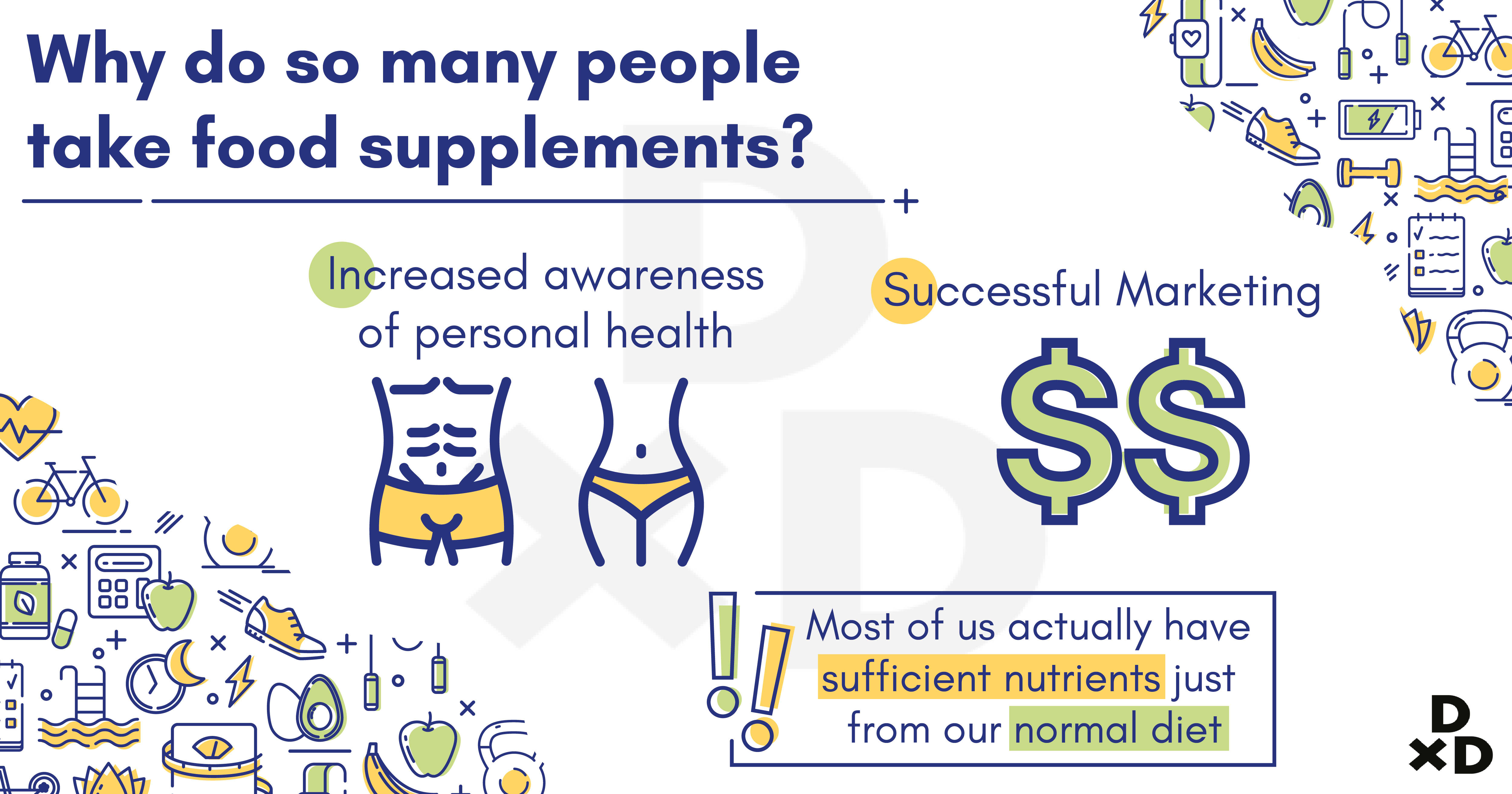
In one way, the rise of supplements use is a sign that people are more aware of their health. But on the other hand, it is basically a successful marketing campaign targeted to our consumeristic society.
I am sure you have seen many advertisements all around Singapore claiming the benefits of taking supplements. They always portray healthy and happy models to further their cause. You might also see influencers posting about how certain supplements help improve their lifestyles.
It is important to realize that if you do need supplements, it often has to be individualised. Supplements are not a one size fit all prescription like how advertisements and influencers want you to believe. Those bottles sold without prescription is unlikely to be useful for you.
In reality, most of us can get sufficient nutrients just from conventional foods.
The irony is, most of those who are prone or have deficiencies do not have access to these supplements. People who live in poor or rural areas where conventional food is hard to find are at greatest risk of malnutrition. But in the world we live in, supplements are only available for those who can afford them.
Related: Are probiotics better than Vitamin C when it comes to building up immunity?
Research shows the 49% of the population in the US are using dietary supplements [2]. It was also reported that Singaporeans spent $490 million on vitamins and supplements in 2017 [3]. People in first world countries with good nutrition are the ones keeping the industry alive.
Why is a balanced diet more important than a normal diet?
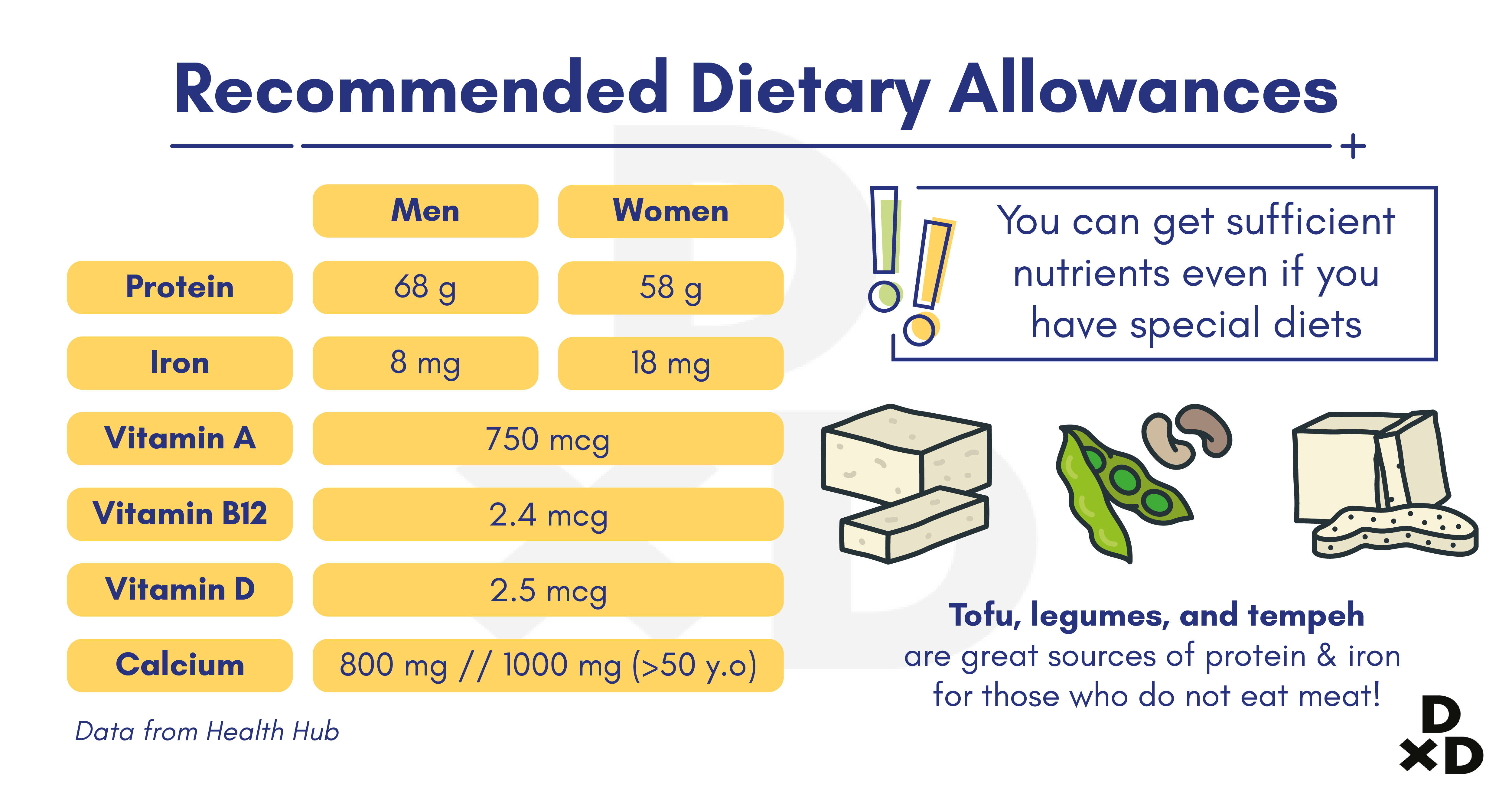
I have mentioned both ‘normal diet’ and ‘balanced diet’ in the previous sections. But really, what is considered normal and/or balanced?
A ‘normal diet’ is different for everyone. It depends on your location, religion, and dietary choices. For me, it is rice, meat, and vegetables. For you, it might be something else. There is really no definitive answer.
A ‘balanced diet’ is more important. You can get enough nutrients even if you have a special dietary habit. It does not matter if you eat only halal foods or if you are a vegan. It is a matter of picking the right food combinations. A ‘balanced diet’ is a diet that follows and satisfies the recommended dietary allowances.
The recommendations vary depending on different factors such as age, gender, and degree of physical activity amongst many others. As a general guide, it should include: [4]
- Fruits
- Vegetables
- Legumes (lentils and beans)
- Animal proteins (mean, fish, etc.)
- Whole grain
The recommendations tend to vary minimally for each country. This is because people can have very different diets and lifestyle. They also vary by age and gender. The detailed recommendation for Singaporeans can be found on the Health Hub website.
Why is it good to take food supplements?
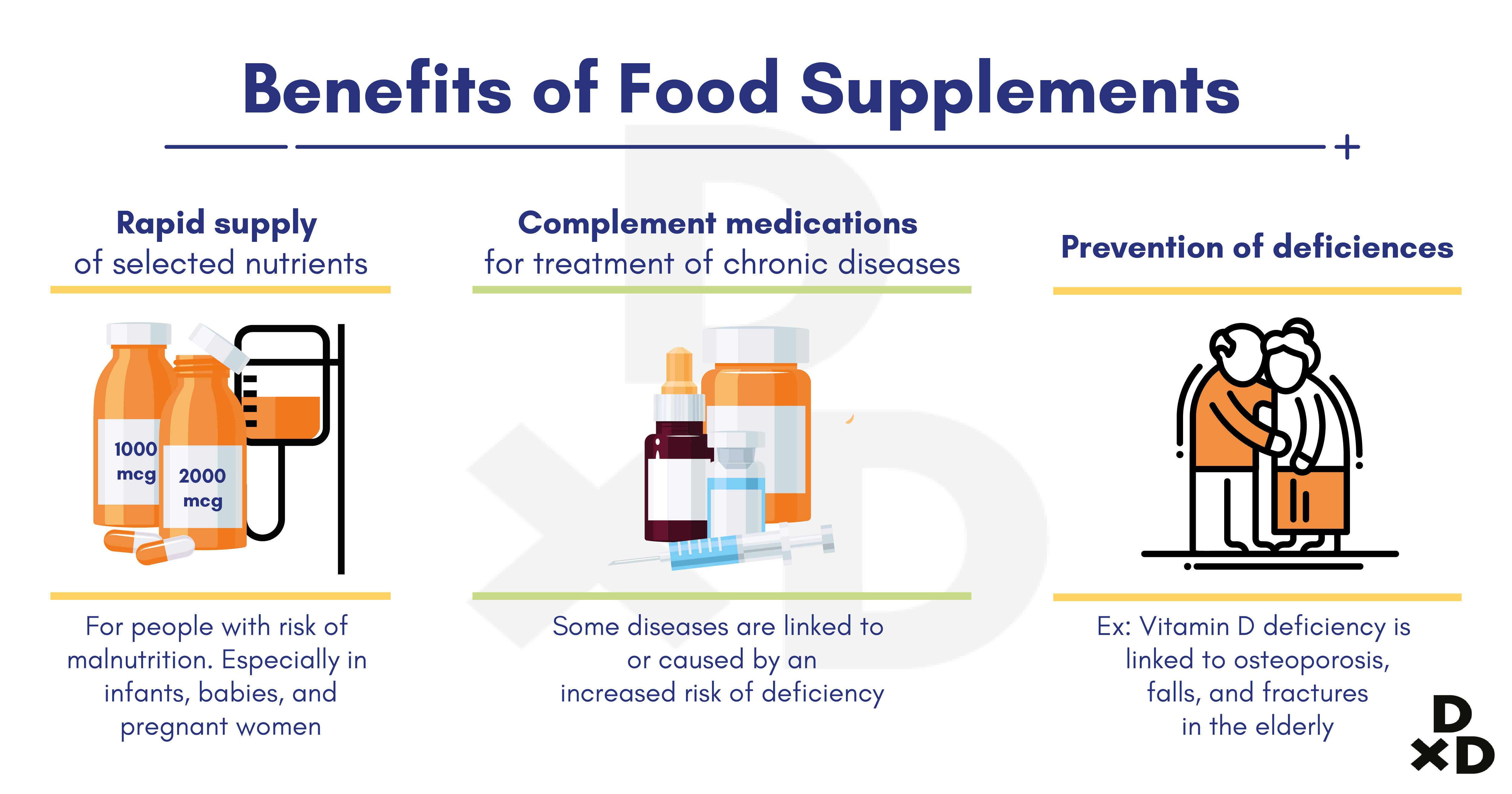
Food supplements have amazing benefits for those who really need them.
People with a vegan or vegetarian diet are often at higher risk of iron, calcium, and vitamin B12 deficiency. In this case, taking supplements might help maintain your body’s balance. This is especially important for infants, children, and pregnant women. You should talk with a doctor to discuss whether supplements are required [5].
Despite being sunny all year round, vitamin D deficiency is a huge concern in Singapore. The deficiency is also caused by an unbalanced diet. They are known to increase risks of osteoporosis, falls, and fractures, especially in the elderly [6]. For the active aunties and uncles out there, I would really recommend that you take a combination of calcium and vitamin D supplements!
Are multivitamins a better form of a food supplement?
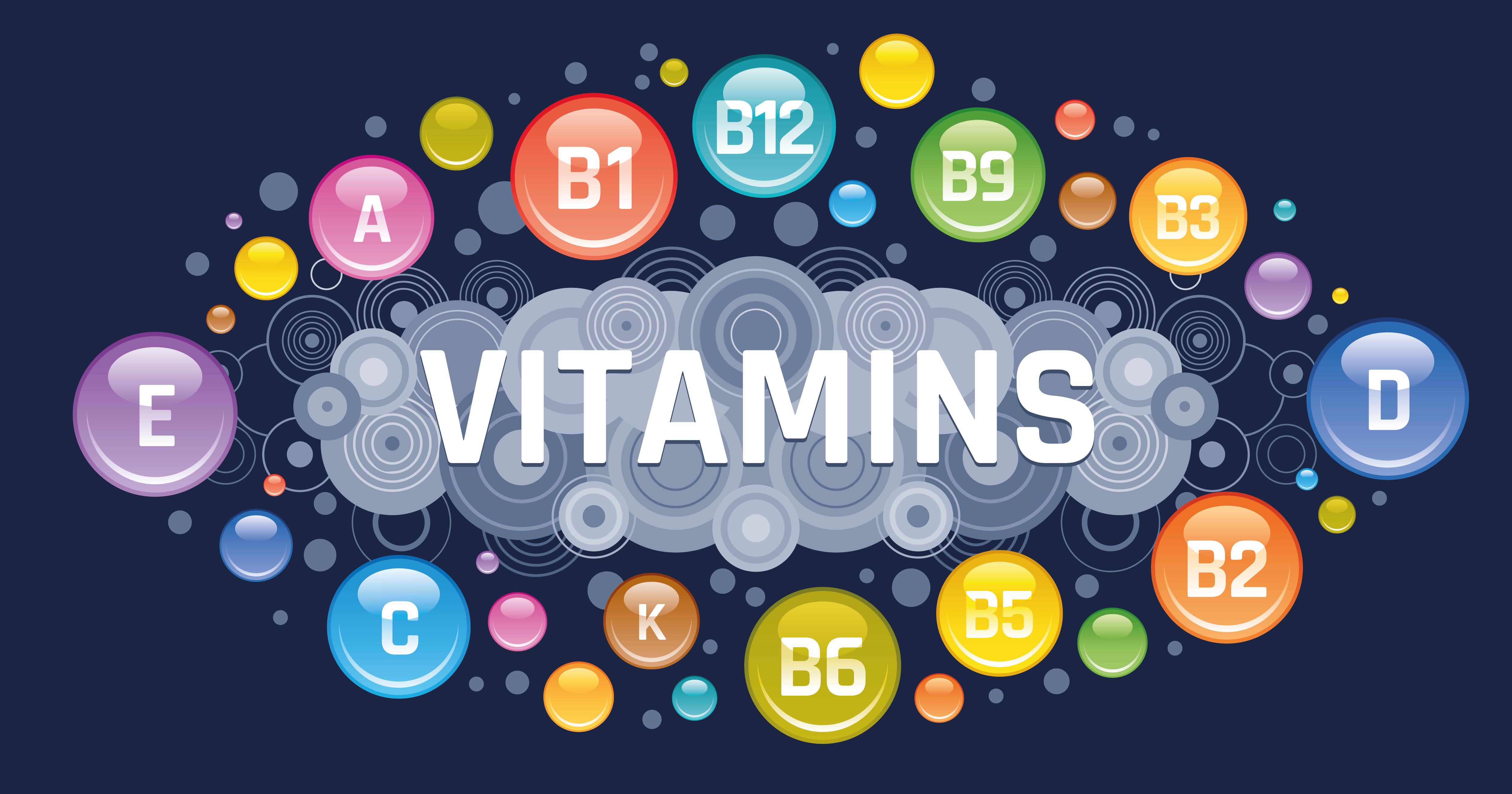
You may also think maybe taking multivitamins will be better because it has everything. It is also widely available and quite affordable in Singapore.
In reality, multivitamins offer no significant benefits to most people. A study in 2013 showed that multivitamins have zero effect on all causes of mortality [7].
Another study done in 2006 also shows that multivitamin and mineral supplements do not reduce or prevent cancer and chronic diseases [8]. It is interesting to note that these studies are done in countries who are not dealing with malnourishment.
Also read:
What are some helpful supplements for acne-prone skin?
What vitamins can help to improve the quality of the egg?
Can dietary supplements be harmful?
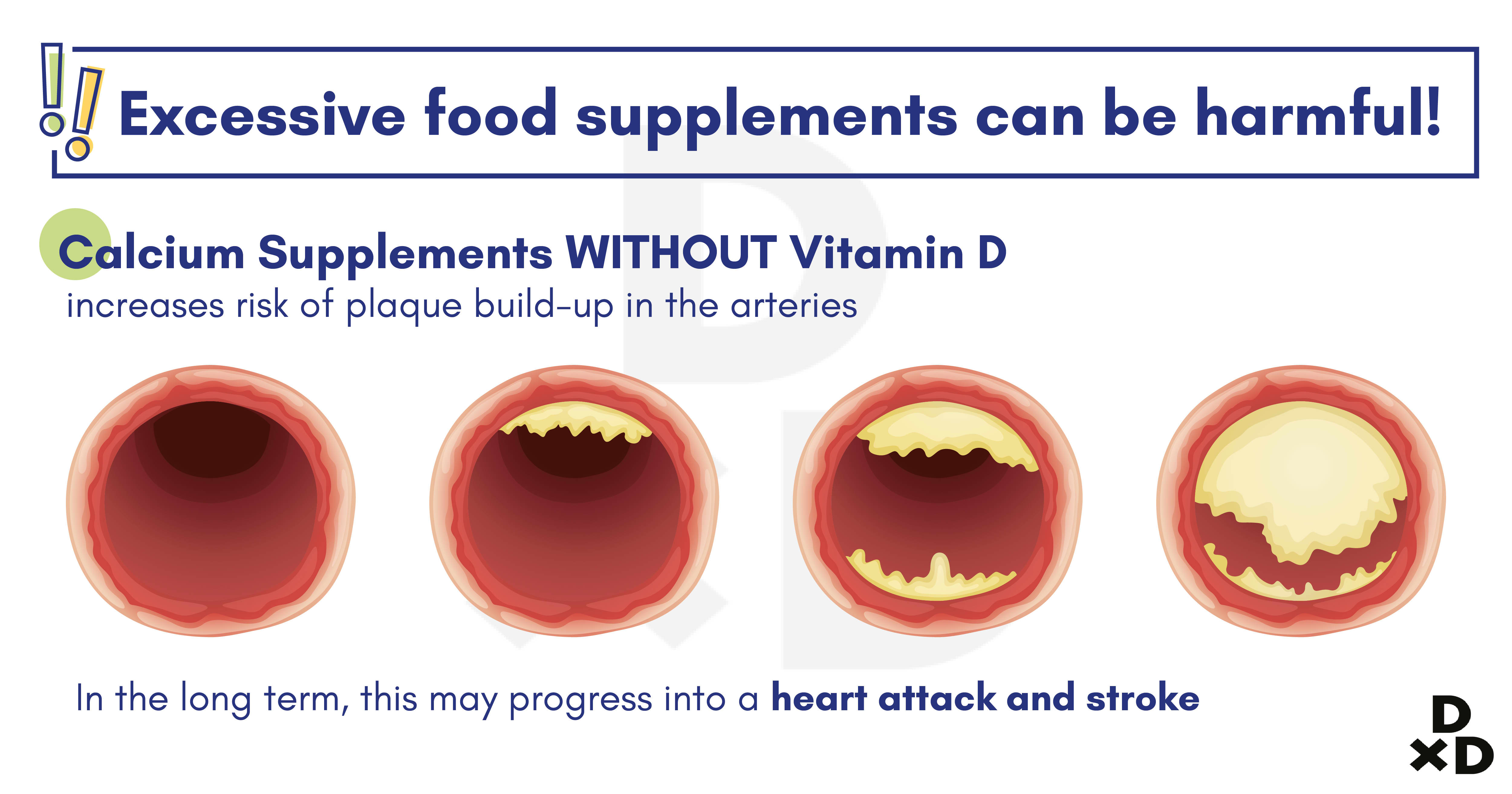
YES! They can be detrimental to your health if taken in excess or indicated wrongly.
Too much calcium supplements WITHOUT Vitamin D may increase the risks of plaque buildup in the arteries. This may lead to a heart attack, stroke, and other cardiovascular diseases [9]. Studies have also linked calcium supplements to increased risk of kidney stones [10].
It is interesting to note that a high intake of calcium from conventional foods actually DECREASES the risk of kidney stones and heart diseases!
Find out more about Cardiovascular Risk Reduction!
Point is, there are many complex interactions between the minerals that only whole food can provide and the human body absorbing them, whereas supplements alone may not do the same job - and in some cases can cause harm.
Can food supplements replace medication?
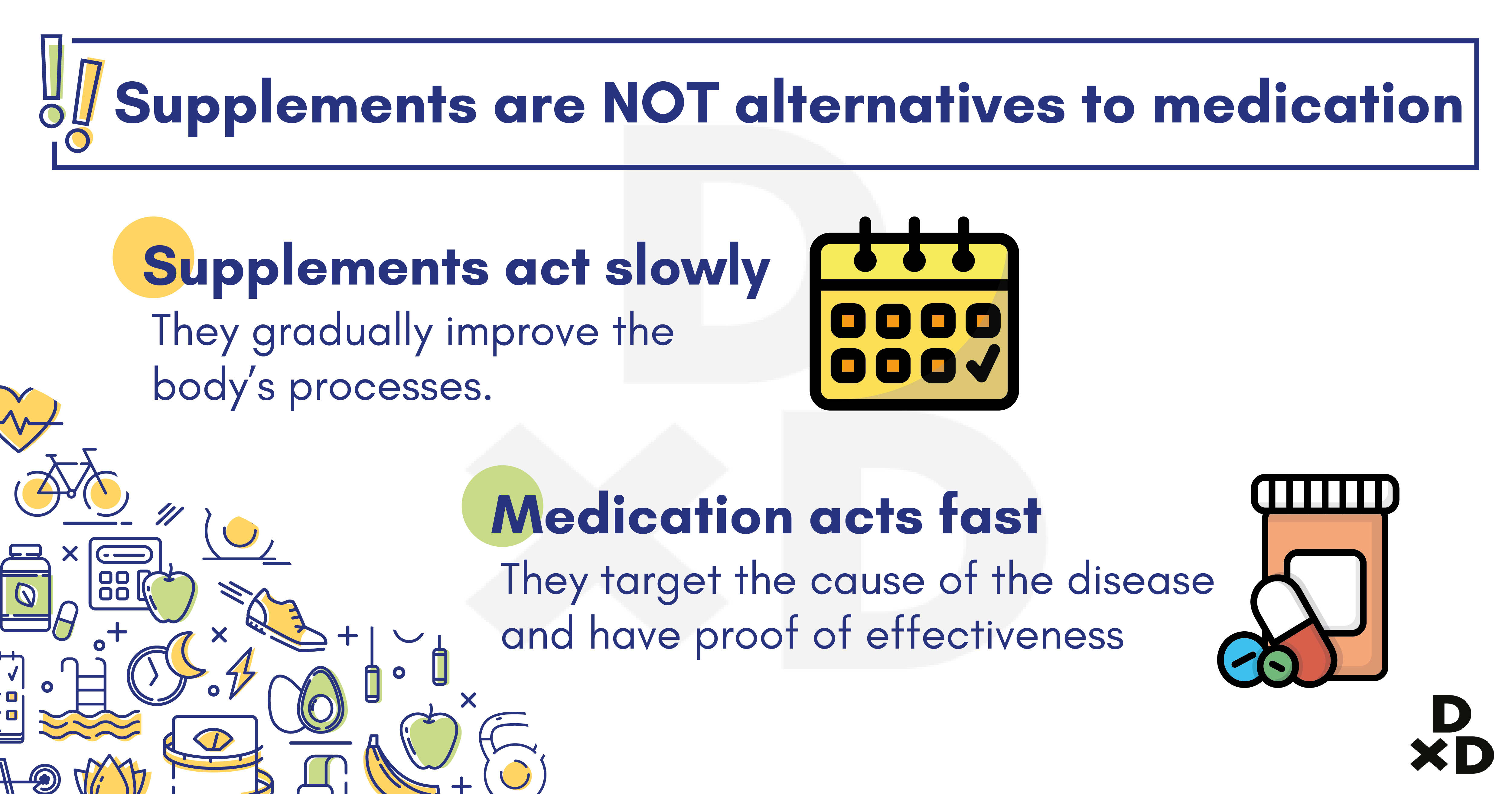
NO! Food supplements are not aimed to replace conventional medications. They generally do not act fast as they usually work by gradually improving the body’s processes.
If you have an infection or needs to relieve pain, you are better off taking normal medications. They work faster and have definitive proof of effectiveness.
Dietary supplements often do not undergo strict clinical trials that are required for medications. They are also not assessed by Singapore's Health Sciences Authority (HSA) for their effectiveness. This is why some side effects and whether or not they work is unknown. As a general rule, never take any supplements that claim to treat a certain disease [11].
Should I take dietary food supplements on top of medication?
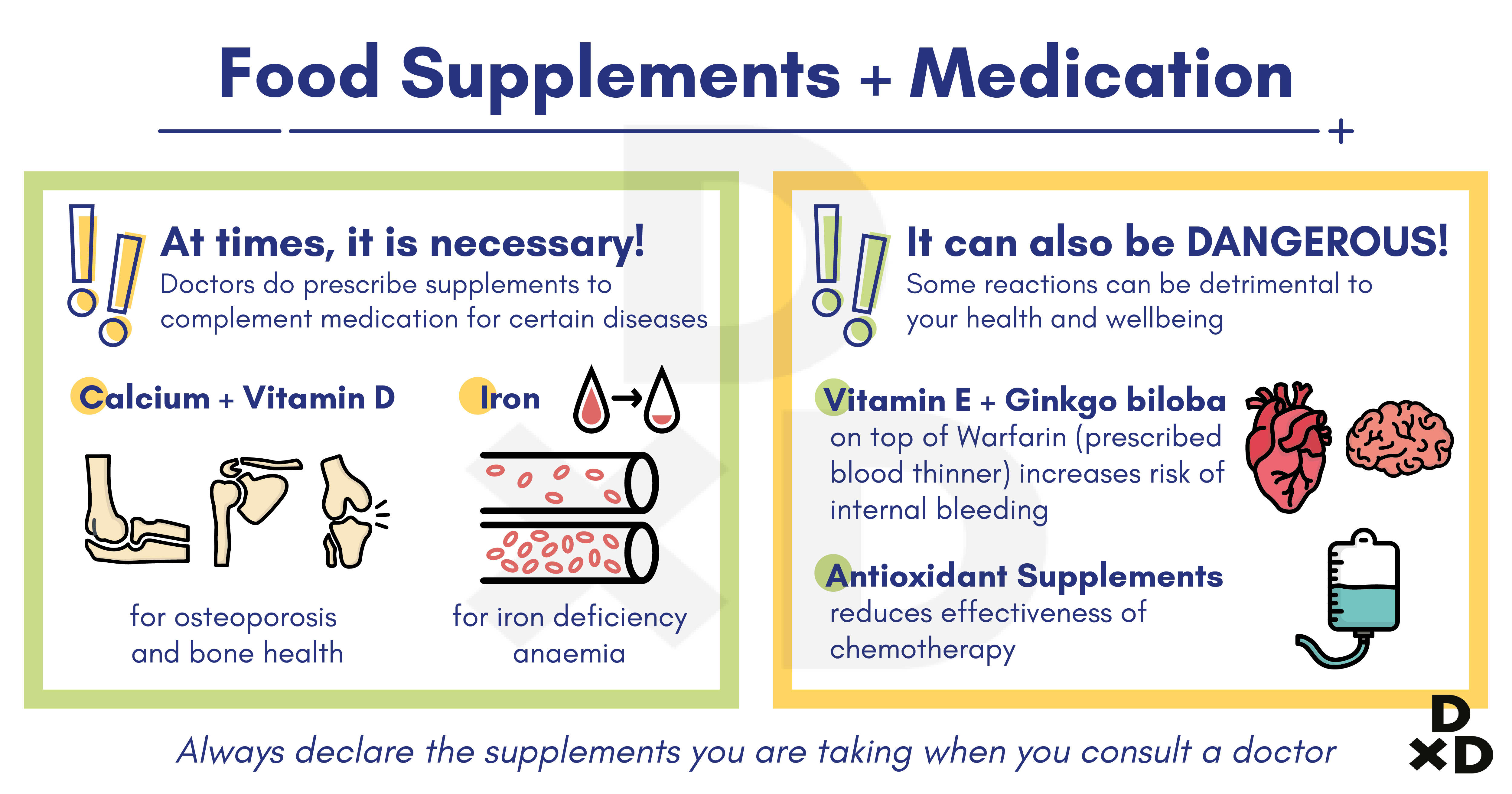
Depends. Doctors do prescribe supplements along with medication to treat certain diseases.
Some common examples practiced in Singapore include:
- Calcium and Vitamin D for osteoporosis and bone health [12]
- Iron for iron deficiency anaemia (low blood count)
It is important to note that a reaction between supplements and medications can be dangerous. Some examples:
- Vitamin E supplements and Ginkgo biloba on top of warfarin (prescribed blood thinner) increase risks of internal bleeding and stroke [13]
- Antioxidant supplements (Vitamin C & E) reduces the effectiveness of chemotherapy [14]
You should always consult a doctor to figure out which ones can be taken together. Remember to declare the supplements you are taking every time you go for a consultation!
Also read: How effective is oral intake of collagen and hyaluronic acid in preventing wrinkles?
Is it better to get nutrients from food or supplements?
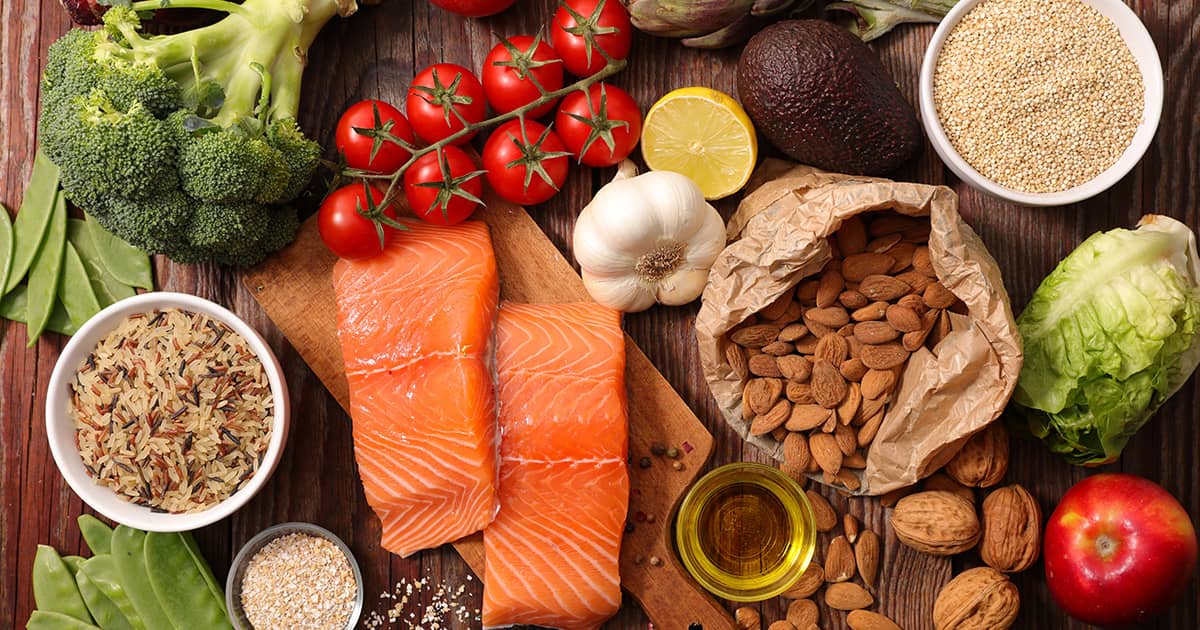
Food supplements cannot replace food. The benefits of whole foods go beyond what is even known by modern nutritional science.
The reaction between vitamins, minerals, and our body is very complex. It is a system that science might never figure out. Supplements tend to only have one certain vitamin or mineral. This might cause harm because no one can fully understand each and every nutrient our body needs. Both excessive and lack of nutrients can lead to diseases.
Taking Turmeric for Joint pain? Read this guide on Japanese White Turmeric for Osteoarthritis
Take total parental nutrition as an example:
This is the term used when sick patients in intensive care are given their ENTIRE nutrients intravenously (through IV). This means that doctors have to determine exactly what nutrients to give the patients.
- At first, choline (found in broccoli and egg yolk) was left out of the IV. In that period, some patients ended up developing fatty liver disease.
- In 1995 researchers discovered the link between choline deficiency and fatty liver. The research also found that choline supplements reverse the condition.
- It was only in 1998 that choline got recognized as an important part of parental nutrition. Afterwards, an Adequate Intake Level Recommendation for choline was officially created [15].
A whole-food based balanced diet is the way to go if you do not have any underlying deficiencies.
Singapore is blessed with an abundance of cuisines. Let’s not replace chicken rice and sambal kangkong with supplements just yet! It will take a long time, even decades, before science can fully comprehend all the nutrients our body needs.
Related: 11 Common Food Myths Busted By An Experienced Clinical Dietician
Are food supplements suitable for children?

There is no harm, as long as it is taken in moderate amounts. However, there are no known benefits unless the child has diagnosed deficiencies.
You also have to be a bit more cautious as a child’s metabolism is very different as compared to an adult.
They are not always bad. At times, food supplements might actually be required. In developing countries, some infants suffer from persistent diarrhea. In this case, zinc supplements are often prescribed to relieve the condition [16]. This is quite rare in Singapore and it is always best to consult a doctor before giving your child any supplements.
There are also homeopathic products that claim to increase immunity to certain diseases. No research has tested their efficacy and effectiveness so it is best to avoid them. Vaccination is still the best way to protect our child and the community from infectious diseases [17].
Related: Can I continue to give my child vitamins/supplements while he is on medication?
What are the dangers of weight loss supplements?

There are certain products marketed to replace food and help people rapidly lose weight. I would highly discourage anyone from choosing this method.
These products often have unknown effects on your overall health, especially in the long run. Most of the time, they also do not work. They only offer a short-term solution. Worst, some products are also tainted with dangerous prescription drugs [17].
There are many other safer and healthier methods to lose weight. As annoying as it sounds, a balanced diet and exercise is probably still the best way to lose unwanted body fat.
Also read: A Doctor’s Ultimate Guide to Effectively Losing Weight
What happens if I overdose food supplements such as shakes and bars?
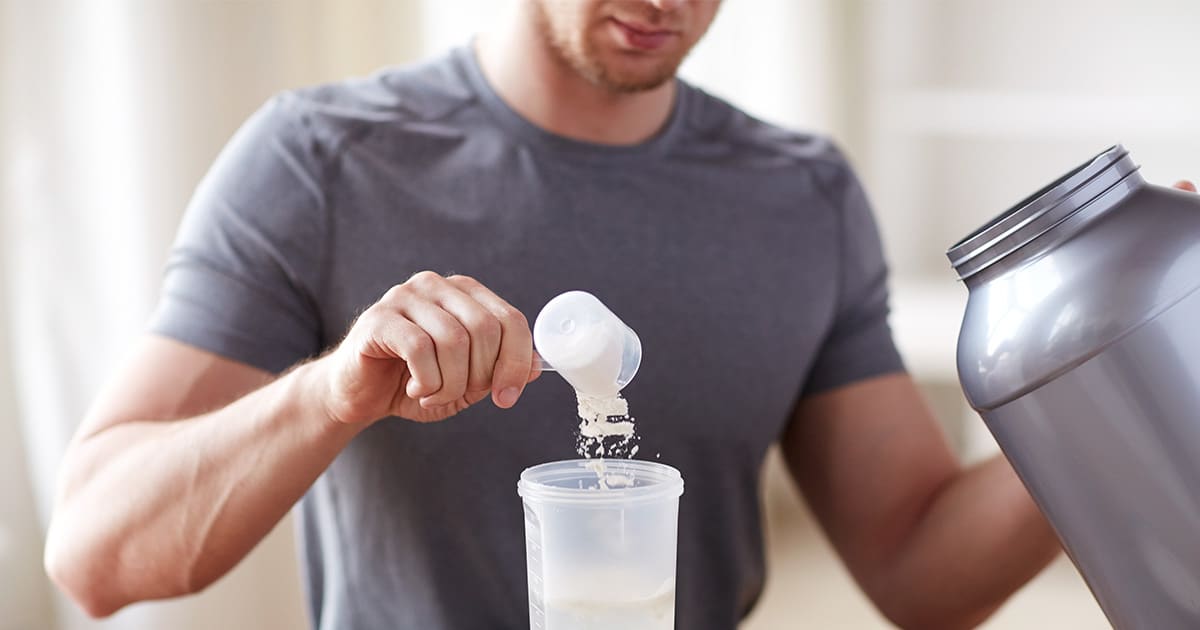
It is not just excessive vitamins that can be dangerous for you. Food supplements are really anything that supplements your conventional diet. Excessive macronutrients like protein can also be a problem.
Doctors often use a nutritional liquid supplement to help patients at risk of malnutrition. They are cheap, readily available, and can rapidly supply the body.
On the other hand, body-builders tend to take advantage of protein shakes and bars to quickly bulk up. Taken excessively or over a long period of time, they increase the risks of: [18]
- Cholesterol
- Cardiovascular diseases
- Cancer
- Kidney failure
- Weight gain
- Constipation
On top of that, some shakes and bars may also have high sugar content. To avoid unwanted side effects, it is important to always be aware of what you consume. Check the packaging and consult your doctor if necessary.
What are food supplements commonly found in Singapore?

The most common food supplements people get from the pharmacy are probably multivitamin tablets.
My examples above show that there is no apparent benefit. If anything, they are found to cause a modest 8% decrease in cancer diagnosis [19]. But, they do not cause any harm either.
Though some do not go through strict clinical testing, they do have to pass certain tests that deemed them safe for consumption. If you get them from a reliable pharmacy, be assured that they are safe. They may have some side effects but they should all be listed on the packaging.
Are food supplements Medisave-claimable?

If you are prescribed food supplements in your inpatient bill, they are usually Medisave-claimable.
However, this might not be the case for outpatient treatment. Medisave only partially covers outpatient supplements cost for certain diseases that fall under the Chronic Disease Management Programme. You can check with your doctor to find out more.
With private insurances, they are usually covered if you have proven deficiencies. A common example is iron deficiencies in females which causes anaemia. That said, this really depends on your policy and your insurance provider. Do contact your agent to make sure.
Is it good to take food supplements?
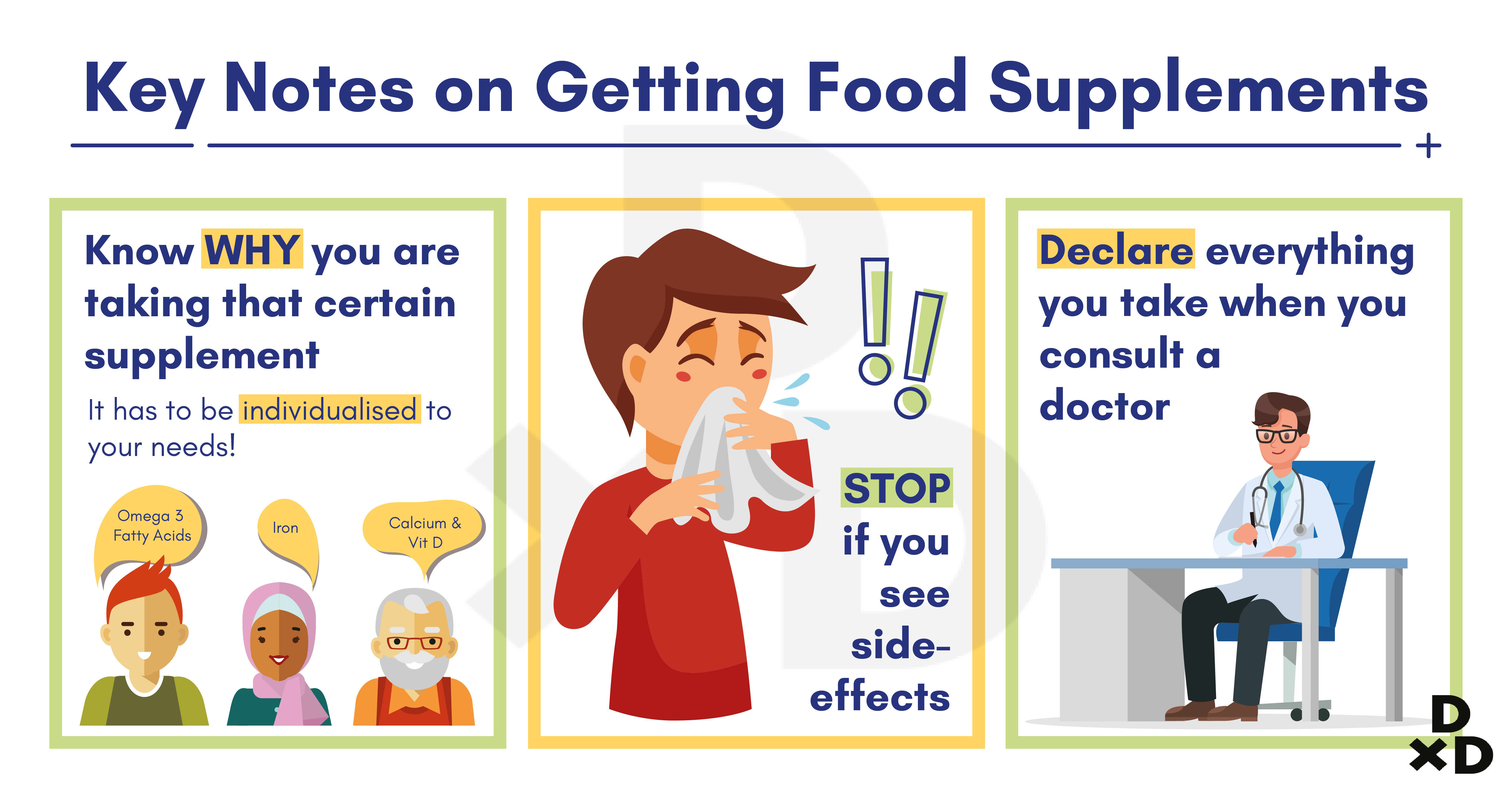
If you have a normal and balanced diet like most Singaporeans, probably not. The only way to find out for sure is to go for a consultation with your GP or dietician. If you ever really need supplements, it has to be individualized to you! Supplements sold without prescription is unlikely to give you any benefits.
That said, some supplements and multivitamins are really affordable. In Singapore, you can also easily access them. If they make you feel better and give you peace of mind without noticeable side effects, there is no strong reason not to continue taking them.
Related: This Is Why I Don't Take Any Supplements
A few key notes from me:
- Always know WHY you are taking supplements
- Stop if you see side effects
- Always declare the supplements you take during medical consultations and check-ups
I wrote this article to invite you to rethink and be more aware of what you consume. I am not against supplements and in my practice, I do recommend some patients to take them.
The most important thing is to find out what is suitable and recommended for you. Just because they are good, it does not mean that it is necessary.
If you are concerned, ask your doctor the next time you go for a consultation!
Dr Tyler Lim is a General Practioner with the Iron Suites. His clinical interests lie in the field of Lifestyle Medicine, Dermatology and Venereology, Sexual health, Men’s Health as well as Sports and Nutritional medicine. On top of that, Dr Lim also has a special interest in the role of iron to improve exercise capacity, physical endurance and overall energy levels of his patients.
Read more from Dr Tyler Lim in his Q&A here.
Would you like to ask any related health questions?
You can Ask A Doctor right away, or view the complete list of Human Sessions.
